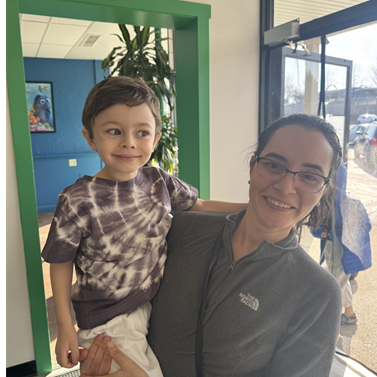With millions of American parents having to adapt to a new life of balancing their work-from-home and their kids’ virtual schooling, we know that 2020 has been a rough year for you.
There’s no doubt that we’re all living through a historical event that none of us could have predicted or prepared for. As parents, we know that you do fear for not only your own health and well-being but also that of your children.
One of the first things you need to remember when you’re struggling with your work-life balance during the COVID-19 pandemic is that you are not alone. For the millions of parents who have to work remotely for the first time, balancing your home life around your work life is a massive culture shock.
Of course, your situation will always be different from that of other parents, not only in your kids’ grades but around the world. If you’re working from home, and your children can go to school through Zoom classes, then you may already be thanking your lucky stars that you have social distancing options. However, that’s not to say that you’re not worrying about keeping up with your workload while supporting your children with their at-home learning.
Thankfully, there are more options open to you now than there was when COVID-19 was first confirmed in the US. So, today, we’re going to take a look at how you can maintain your work-life balance and support your children with their schoolwork.
Keep Fit for Better Focus
One of the biggest challenges you’ll already have faced is that there are fewer opportunities to keep your kids active. As every parent knows, being able to run your kid around until they tire themselves out is a godsend when you need to get things done.
However, did you know that keeping your kids active can help them out with school? Research has found that exercise triggers the types of endorphins that help your kids concentrate and memorize information, making it one of the best ways to support them with their virtual learning.
At Neutral Ground Martial Arts, we teach kids as young as 3 how to be active in a fun, safe, and exciting environment. We know that younger children have a hard time focusing, which is why we’ve designed our Tiny Ninjas program to help build their concentration and confidence. For older children, we also offer classes for kids between the ages of 6-8, 9-12, and teens classes at 12+, so your kids will always be learning alongside other students of a similar age.
Create a Structured Routine
Both you and your kids will be used to following a routine; however, you can’t expect that these routines will always match up. After all, the typical school day tends to run between 7 am – 3 pm, while you may be used to working 9 am – 5 pm.
So, if your child is learning through Zoom classes, you can mimic the school day by creating a daily routine that everyone sticks to. We recommend making time for:
- Waking up
- Eating breakfast
- Logging on to Zoom
- Lunch
- Completing offline work
- Chores
- Relaxation
- Homework
- Bedtime
Giving your kids a structured routine, you know at every point during the day where they should be and what they should be doing, giving you more headspace to focus on your work.
Parents of older children, in particular, will benefit greatly from this system, as they will be more able to self-direct their learning, chores, and relaxation time without needing your intervention.
We know that this won’t solve the need to be present to help your kids with their at-home learning throughout the day. After all, younger children may need help at various points to log on to their Zoom classes and their offline work. However, having a routine means that you’ll have a better idea of when your kids will need you around, giving you more power to work around their virtual schooling.
Discuss Your Options With Your Manager
If you’re worried about your ability to work around your kids’ virtual learning schedule, then it’s best to talk to your boss and see what they can do to help you.
With most parents struggling, many managers are willing to offer flexible hours, at the very least, around a set ‘core hours’ period, so that you can be present to support your children and complete your work responsibilities when they don’t need you around.
If you’ve been asked to go back into the office, then you could ask your boss if you can work from home until your child’s school reopens. This may not be possible with every office, so be prepared to compromise on flexible hours or negotiating a temporary move to part-time hours.
Regardless of the outcome, you’re hoping for, talking to your boss before your workload gets too much for you to handle is the best way to stay on their good side. Most managers would rather you talk to them before things get too bad, and they’ll appreciate that you want to negotiate a compromise instead of becoming burned out and unable to work.
Use Your Support System
As the popular saying goes, it takes a village to raise a child. However, whoever came up with that phrase clearly didn’t expect the need for social distancing.
Now more than ever, it’s vital that you leverage the help offered by your loved ones and divide responsibilities between yourselves. If you’re parenting in a two-parent household, and both of you are working from home or working shifts, then consider splitting the day’s “on-call” responsibilities between the two of you. That way, at least one of you can concentrate on their work, while the other is ready to help with Zoom classes and offline work.
Multi-generational households have even more of an advantage now, as there are more people around that can help you to take care of your kids while you need to work remotely. We know that not everyone might feel able to help your kids with their at-home learning, but consider asking other people who live with you if they can prepare snacks, lunches, or take on extra chores if they’re able to.
Of course, if people in your support system don’t live with you, and they’re vulnerable to COVID-19, then we urge you to take caution and only let them help as a last resort. Unfortunately, you don’t know how safe other people are being during the pandemic and whether they’re wearing a mask or observing social distancing, so it’s important to do everything you can to keep your household safe.
Prepare Meals and Snacks in Advance
Whether you’ve only got time to plan what you’re eating for the week ahead, or you’re the kind of person who loves batch-preparing meals and snacks on the weekend, meal planning is a great way to relieve some of the stress you’ll face during the week.
This is also a fun activity you can get your kids involved with, too, depending on how old they are and what you need to do. Learning how to cook is a fundamental life skill, and planning meals ahead of time can help your kids learn how to prepare food and prevent waste. Letting your kids decide what to eat for one meal a week can also be a great way to get them involved in house chores, particularly if they’re not old enough to help with meals physically. If your children are older, you can even get them involved by asking them to portion out snacks, chop fruit and vegetables, or even make them responsible for one of the week’s evening meals.
Set Clear Boundaries
When your kids are learning via Zoom classes, and you’re working at home, it gives them even more chances to run to you for help when they don’t understand something or whenever they need something.
If you’re struggling with interruptions from your kids throughout the day, sit them down and talk to them about when they can and can’t come to you for help. You might find it useful to buy or make a sign that you can put on the door when you’re on a call, so your kids know that they can’t ask you for help on their homework right away.
While smaller children might find this more difficult than older kids, it’s important to make sure that everyone knows the limits on help from their parents. Many parents have also found it useful to schedule independent activity time for their kids, where the only rule is that they have to do that activity by themselves. This can be particularly useful for parents who have meetings around the same time every day or week.
Establish Work and School Zones
This is easier said than done if you live in an apartment or small house, but setting physical boundaries is an important part of balancing your work and your kids’ home learning.
Whether it’s a corner of the kitchen table or your spare room, designate that space as your ‘office’ and make it clear that you’re focused on work and shouldn’t be interrupted when you’re in that area unless it’s an emergency. You can also designate similar school zones for your kids with the same boundaries around interruptions, which can be a great way to teach them about independence and respect.
This approach works really well with younger children who might not understand the boundaries I talked about in the tip above. Having a designated zone is a physical reminder of what they can and can’t do.
If you’re struggling to maintain your work-life balance, and you never feel like you can switch off, this is a great strategy to maintain your mental health. Designating a workspace means that you can walk away and leave all of your work materials behind at the end of the day. For both you and your kids, this is a great way to separate home and work life, and make sure that everyone feels like they’ve got the space to relax at the end of the day.
Take Time for Yourself
You must make time every day for self-care. While self-care has become a buzzword in recent years, it’s an important part of maintaining your mental health at any stage in your life, not to mention in the middle of a global pandemic when you have to manage virtual learning and remote working.
So, make sure that you spend at least an hour every day doing things that you enjoy. Whether that’s a group activity, like playing video or board games, or it’s time by yourself, it’s a great way to decompress from the day and remind yourself that you’re just as important as your other family members.
2020 has been a tough year for all of us, and that has inevitably taken its toll on everyone’s mental health. Mental health experts often say, “you can’t pour from an empty cup,” and they’re right. You need to recharge your batteries and spend time doing the things that make you happy so you can do the best job you can as a parent. While things are tough now, you can take solace knowing that this too shall pass, and having to manage a work-life balance while your children are learning virtually is only a bump in the road.





































































